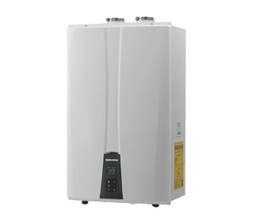K. Kelly, Inc. quotes and installs water heaters.Water Heaters: Choosing The Right Water Heater
Considerations when buying a new water heater The time will come when your hot water heater needs to be replaced. The decision may be thrust upon you in the form of a surprise cold shower or, worse still, a surprise leak while you are away from home. Or, you may decide to buy a new water heater when you weigh the cost of repair against the cost of replacement. In the past it was a simple choice: Replace your current storage tank water heater with another exactly the same. Today, however, there are a lot of new options to consider as you seek to improve energy efficiency and the green living profile of your home. Water heater basics to consider:
When considering water heater replacement, You’ll first want the right size hot water heater with the best recovery rate for your family’s needs. It should deliver hot water when and where you need it in the most energy efficient and cost-conscious manner. Depending on the layout of your home, you may need more than one hot water heater to effectively supply your demand. Repair or replace that water heater? As a good rule of thumb, we at K. Kelly, Inc. recommends that you never spend on repairs more than half the cost of replacing your hot water heater. “In most cases, residential water heaters that are out of warranty should be replaced,” says Kevin Kelly. “The cost savings from a new water heater’s efficiency far outweighs the repair cost and lack of performance of an old water heater.” Types of hot water heaters to evaluate:
While electric water heaters have storage tanks and provide hot water in much the same way as do gas ones, most electric water heaters use two electric elements, each with its own thermostat. Because electric water heaters have a low recovery rate, they are slower to generate hot water, which must be taken into consideration when selecting the tank size for this type of system. Tankless water heaters cost substantially more than either gas or electric. Their efficiency advantage is obvious; they provide hot water only as needed so there is no storage tank and no standby heat loss. Some brands promise up to 40% energy savings. Since there is no tank, the space saving feature is huge, especially in some settings. Multiple hot water demands at the same time may tax a tankless water heater, and in these situations more than one unit is optimum. Solar water waters include storage tanks and solar collectors. They can be a cost effective solution in any climate and are powered using free energy from the sun. Systems installed in higher latitudes may require additional design requirements that will add to the complexity and cost of the system. Cost considerations Water heater prices vary for a wide range of reasons, including the water line connections, valves, venting, gas line, strapping, access, and type of water heater. Contacting a professional plumber for a free in-person evaluation of your particular situation is the best way to check pricing. A “blind” quote over the phone is often inaccurate. Choosing a new water heater can become even more confusing when you factor in the standard, deluxe and premium models within each type. Refer to the warranty to assist you. Five, ten and seven year warranties are the most common. The life of a storage tank water heater is dependent on the tank, the quality of the water, number of people in the home and the temperature setting of the tank. A tank that is built better is usually going to cost a bit more and have a longer life. Spending a little extra up front will give you a more efficient water heater, which will save you money in the long run. For both tankless and solar water heating systems, the larger initial financial outlay may discourage many people from these options, even though long-term savings are substantial. Energy efficiency considerations for water heaters Although both gas and electric water heaters lose some of their efficiency because water is constantly being heated in the tank, their efficiency is much improved over the past. Both gas and electric storage water heaters, if heavily insulated, significantly reduce heat loss and have a thermal resistance (R-value) of R-12 to R-25. Always look for an R-16 or better insulation rating. Some tankless hot water heaters claim up to 40% in energy savings. The energy efficiency is obvious: no storage tank equals no heat loss and no running water as you wait for it to warm up. Overall, high efficiency hot water heaters will use 10 to 50 percent less energy than older standard equipment. Look for units with the Energy Star® symbol to further enhance the green living standard of your home. Routine maintenance of residential water heaters To keep your traditional storage hot water heater in tiptop operating condition, you should have it flushed and inspected annually by a qualified plumbing contractor. Tankless water heaters require two types of regular maintenance periodically (time frame based on the quality of your water): Check in-line screen filter for debris and flush the unit to keep it free of scale and lime. Although homeowners may perform a portion of routine maintenance for solar water heaters, some professional assistance is required to correct wear and malfunction issues. Repairs include cleaning of the collector, checking for cracks and leaks, and replacing heat transfer fluids. Contact K. Kelly, Inc. by phone or via our online appointment scheduling for information and assistance regarding water heaters. For more information on water heaters or water heater replacement, contact your local Green Bay K. Kelly plumbing professional now to learn more about hot water heater options and installation. From brands such as Bradford White and Navien. |

